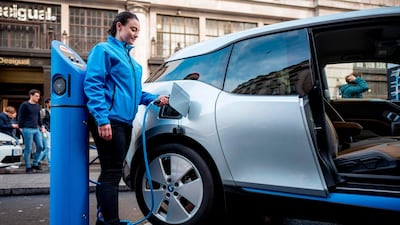As renewable energy expands throughout the Middle East, electric vehicles are poised to be the next big trend as the eco-friendly car becomes cheaper.
“EVs will create an economic change in the Middle East, and we want to play a role,” said Sebastien Arbola, Middle East, South and Central Asia and Turkey region chief executive for Engie. “We don’t see it today, but we will see it tomorrow.”
One of the biggest obstacles for the EV take-off is the cost as batteries need to drop by more than half of their current costs. That is due to change by 2026 as the price for lithium ion battery packs, widely known as the juice behind Tesla’s EV models, falls to about US$100 per kilowatt hour, according to Bloomberg New Energy Finance (BNEF).
Mr Arbola said that the EV industry was at the tipping point as more variety and scale was soon to hit the wider markets. “Not everyone can afford a Tesla,” he said. “In the next couple of years, we will see more than 50 different types of electric cars, all in the range of 400 kilometres.”
It starts with the automotive makers launching new models, several have dedicated a sizeable amount of their future fleet to electric cars, while infrastructure such as charging stations have to also increase.
Engie, one of Europe’s largest utilities, began delving further into the EV market via electric charging stations. Last year the company acquired EVBox, the company behind half of all EV charging points worldwide. “You need a variety of cars to signal an adoption rate, but you also need infrastructure,” Mr Arbola said.
EVBox chief executive, Peter Van Praet, said that the availability of models combined with increased range is what is leading the EV movement.
“When we look at the carmakers, by 2020 there are 100 plus EV or hybrids that will be announced,” he said.
________________
Read more:
Electric cars to give solar industry a lift
The rise of electric cars could spell bad news for oil producers
________________
The GCC is a priority for EVBox and Engie.
Adnan Amin, director general of the International Renewable Energy Agency (Irena) said that it was the region’s forward-thinking initiatives that were helping to grow the green economy, encouraging businesses as well as consumers.
Renewable energy, such as solar and wind, has taken off in the region in less than a decade since Irena named Abu Dhabi as its home. “Bold commitments from countries such as UAE and Saudi Arabia are positioning them to build on their conventional energy leadership, to become leaders in sustainable energy,” said Mr Amin.
“One of the most significant things we have witnessed in the global energy transition over the past 18 months, is the speed and degree to which renewable energy cost competitiveness has strengthened, and much of that cost progress has been witnessed recently in the UAE and Saudi through competitive procurement processes, resulting in record-low costs,” Mr Amin said.
“Renewable energy will not only help to improve health by raising air quality and reduce carbon emissions, which in turn can save us from the most dramatic and perilous consequences of climate change, but it is — and will continue to — create skilled jobs, offer secure energy access and support national prosperity across the region.”

